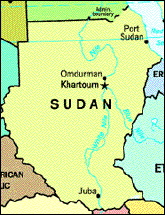
The Arabized Muslim north has resolutely tried to impose an Islamic state on the non-Arab, non-Muslim peoples of the south, who are resisting with fierce determination. "While the major northern political parties have tried to balance their Islamic agenda with accommodating the non-Muslim south, the ruling National Islamic Front, in contrast, has adopted a more oppressive approach. The front has assumed the mantle of Islamic fundamentalism and declared a holy war, jihad, against the infidels in the south, whom it believes to be supported by the Christian West and Zionist allies. With religious zealotry, the regime has reached out to like-minded radicals--governments, organizations and terrorist movements--for solidarity and mutual support." (Deng, 1998). Sudan's government of the National Islamic Front has been linked by not only by the United States but also by the United Nations, to international terrorists, including Osama bin Laden, Carlos the Jackal, Hamas members and others.
It also placed the opposition parties to the National Islamic Front in a difficult position. They could not come out openly in support of an action that insulted national pride. And yet on the other hand they couldn’t align nationalistically with a government they consider illegitimate and against which they have taken up arms.
Deng, Francis M. Sudan: The U.S. action exacerbates the civil war and alienates those resisting Muslim fundamentalism The Los Angeles Times, August 28,1998